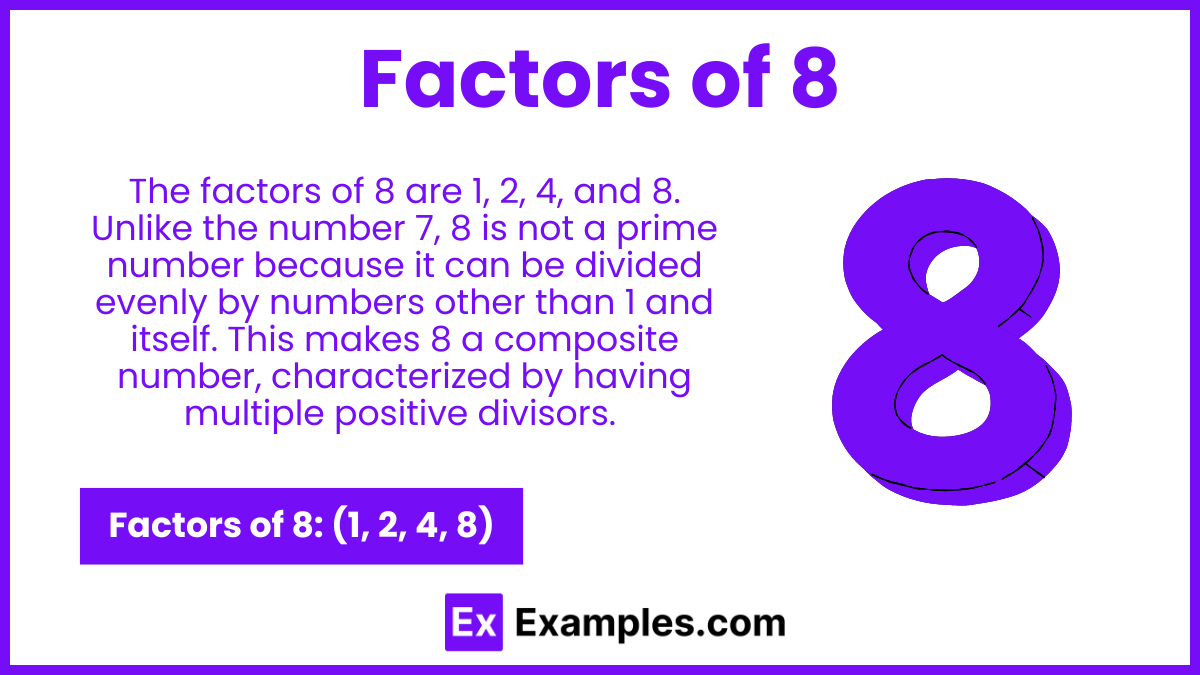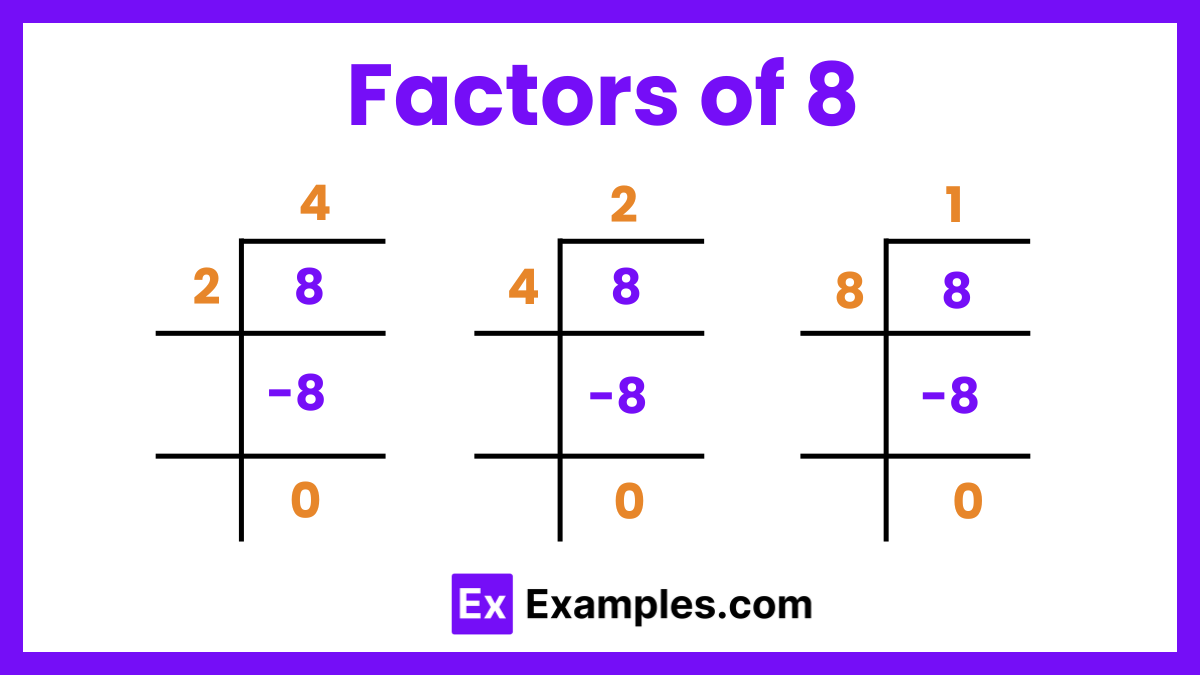What are the factors of 8?
1, 2, 4, 8
1, 3, 6, 8
1, 2, 5, 8
1, 4, 7, 8

The factors of 8 is a fundamental concept in mathematics. Factors are numbers that can be multiplied together to produce another number. For 8, the factors are 1, 2, 4, and 8. This means that 8 can be divided evenly by these numbers without leaving a remainder. Identifying factors is essential for various mathematical applications, including simplifying fractions, solving equations, and understanding number properties. Whether you’re a student or someone looking to refresh their math skills, knowing the factors of 8 provides a solid foundation for more advanced mathematical concepts.

The factors of 8 are the numbers that divide 8 exactly without leaving a remainder. These factors are 1, 2, 4, and 8. To determine the factors, you start with the smallest number, 1, which is a factor of every whole number. Next, you check 2, which divides 8 evenly, giving 4. Since 4 is also an even division of 8, it is a factor. Finally, 8 itself is a factor because any number is always divisible by itself. Therefore, the complete list of factors for 8 includes 1, 2, 4, and 8.
The factor pairs of 8 are (1, 8) and (2, 4).
In multiplication, 1 times 8 equals 8, forming the factor pair (1, 8).
In multiplication, 2 times 4 equals 8, forming the factor pair (2, 4).
Since 8 is not a prime number, it has multiple factor pairs: (1, 8) and (2, 4).
The unique factor pairs of 8 are (1, 8) and (2, 4).
Calculating the prime factors of a number involves breaking down the number into its basic building blocks, which are prime numbers. Prime numbers are numbers greater than 1 that have no divisors other than 1 and themselves. Here’s a step-by-step guide to finding the prime factors of 8:
Determine the factor pairs of 8.
Factor pairs are pairs of numbers that multiply together to give 8.
1 × 8 = 8 2 × 4 = 8
Therefore, the factor pairs of 8 are (1, 8) and (2, 4).
Is 3 a factor of 8?
To determine if 3 is a factor of 8, divide 8 by 3. If the result is an integer, then 3 is a factor.
8 ÷ 3 = 2.6667 (not an integer)
Since 2.6667 is not an integer, 3 is not a factor of 8.
What is the greatest common factor (GCF) of 8 and 12?
List the factors of 8 and 12, then find the largest common factor.
Factors of 8: 1, 2, 4, 8 Factors of 12: 1, 2, 3, 4, 6, 12
Common factors: 1, 2, 4
The greatest common factor is 4.
What are the prime factors of 8?
Prime factorization involves breaking down 8 into prime numbers that multiply to give 8.
8 ÷ 2 = 4 4 ÷ 2 = 2 2 ÷ 2 = 1
The prime factors of 8 are 2, 2, and 2 (or 2323).
Are all factors of 8 also factors of 16?
List the factors of 8 and 16 and compare them.
Factors of 8: 1, 2, 4, 8 Factors of 16: 1, 2, 4, 8, 16
Understanding the factors of a number helps in various mathematical calculations and problem-solving. Here are some helpful tips to understand and find the factors of 8:
The prime factors of 8 are the prime numbers that multiply together to give 8. For 8, these prime factors are 2, 2, and 2 (or 23).
Yes, when discussing factors in the context of whole numbers, the factors of 8 are always positive. These factors are 1, 2, 4, and 8.
In a broader sense, negative numbers can be factors of 8. For instance, -1, -2, -4, and -8 are also factors because they divide 8 exactly. However, typically only positive factors are considered.
The sum of the factors of 8 is calculated by adding all the factors together. For 8, this is 1 + 2 + 4 + 8 = 15.
No, the factors of 8 and 9 are not the same. The factors of 8 are 1, 2, 4, and 8, while the factors of 9 are 1, 3, and 9.
No, zero is not included in the factors of 8. Factors are defined as numbers that divide a given number exactly, and division by zero is undefined.
Yes, all factors of 8 (1, 2, 4, and 8) are either multiples of 2 or can be divided by 2. This is because 8 is an even number, and all even numbers have 2 as one of their factors.
The smallest factor of 8 is 1, as 1 is a factor of every number.
Text prompt
Add Tone
10 Examples of Public speaking
20 Examples of Gas lighting
What are the factors of 8?
1, 2, 4, 8
1, 3, 6, 8
1, 2, 5, 8
1, 4, 7, 8
Which of the following is a factor of 8?
3
4
5
6
Which pair of numbers are both factors of 8?
2 and 3
3 and 4
2 and 4
1 and 5
What is the greatest factor of 8?
1
2
4
8
Which of the following is not a factor of 8?
1
2
3
4
How many factors does 8 have?
2
3
4
5
Which factor pair of 8 multiplies to give 8?
1 and 8
2 and 6
4 and 3
2 and 2
Which number is a common factor of both 8 and 12?
2
4
6
8
Which of the following sets includes all the factors of 8?
{1, 2, 4, 8}
{2, 4, 8}
{1, 2, 8}
{1, 4, 8}
If you multiply all the factors of 8 together, what is the product?
32
64
128
256
Before you leave, take our quick quiz to enhance your learning!

